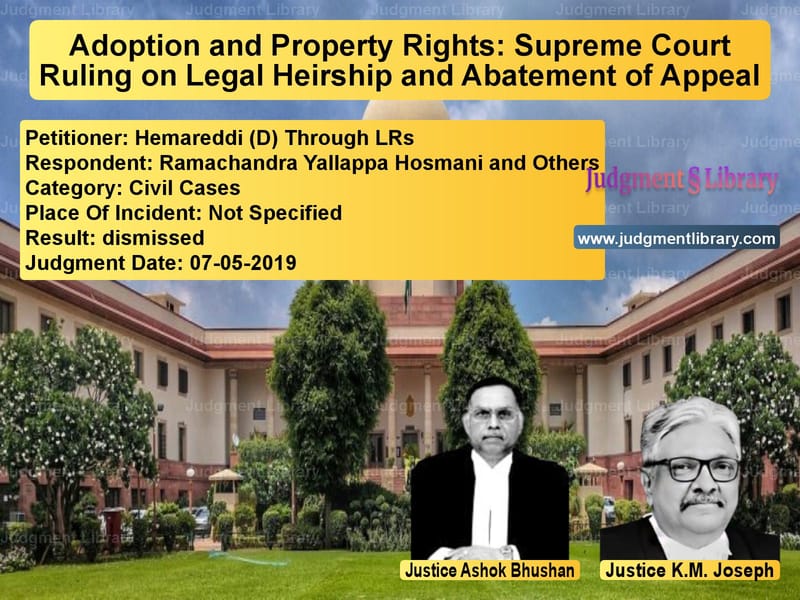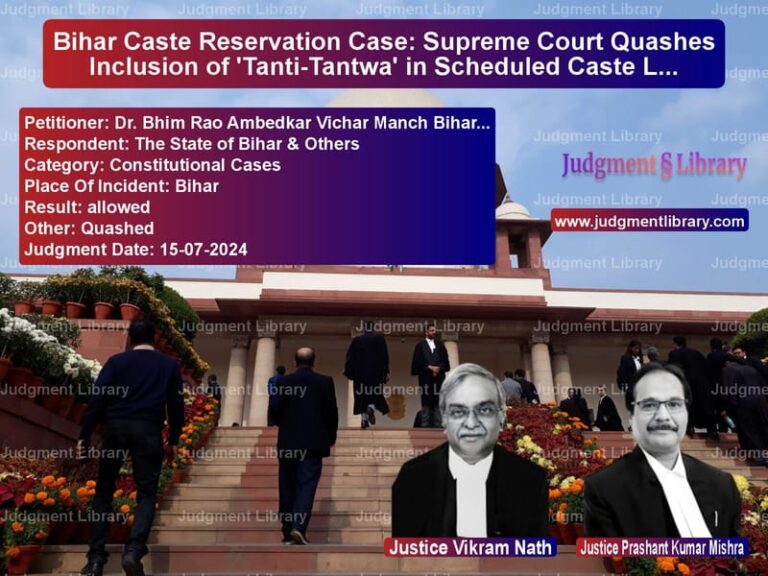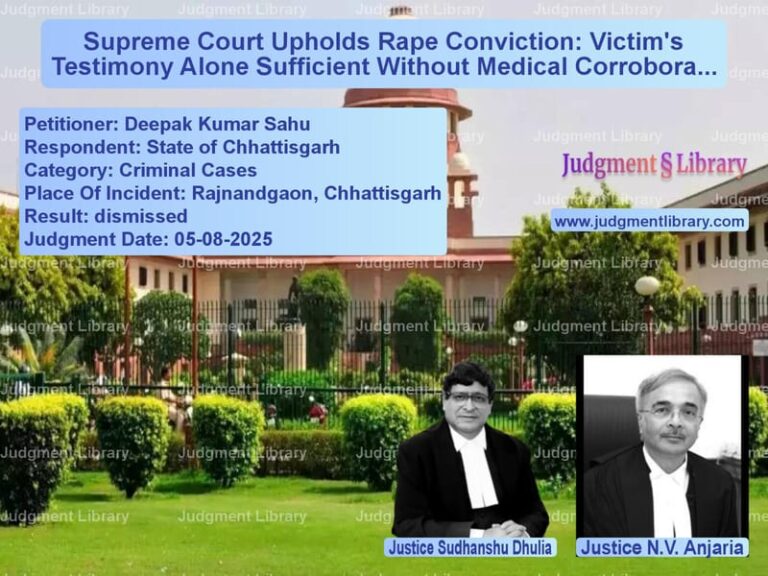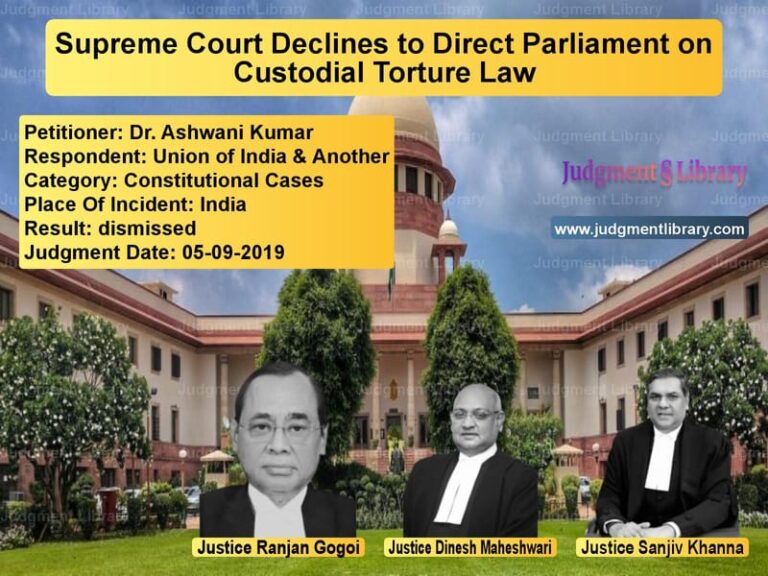Adoption and Property Rights: Supreme Court Ruling on Legal Heirship and Abatement of Appeal
The case of Hemareddi (D) Through LRs vs. Ramachandra Yallappa Hosmani and Others revolves around the legal question of adoption, its impact on inheritance, and the consequences of the abatement of an appeal. The central issue in the case was whether the first defendant was the legally adopted son and entitled to rights over the suit property. The Supreme Court’s ruling clarified crucial legal principles related to adoption, abatement of proceedings, and conflicting decrees.
The suit was originally filed to declare that the first defendant was not the adopted son and had no title or interest over the suit property. The plaintiffs, including the appellant and his late brother, sought a prohibitory injunction against the defendant to prevent him from disturbing their possession of the agricultural land. However, the trial court dismissed the suit, upholding the adoption. The plaintiffs filed an appeal, which became complicated after the death of one of the appellants during the pendency of the case.
Background and Case History
The dispute arose after the death of Govindareddi in 1946, who left behind two sons and a daughter. The plaintiffs were the children of one of the sons, while the second defendant was the wife of the other son, Basavareddi. The plaintiffs claimed that the suit properties belonged to the joint family of Govindareddi and his sons.
The case became contentious when the second defendant allegedly executed a false adoption deed on 27.04.1991, adopting the first defendant. The plaintiffs asserted that the adoption was invalid because, at the time, the second defendant’s husband was still alive. The trial court, however, dismissed the suit, effectively upholding the adoption.
Petitioner’s Arguments
Senior Advocate representing the appellant put forth the following arguments:
- The High Court erroneously ruled that the appeal had abated entirely after the death of the second appellant.
- The appellant had the right to continue the appeal independently, as he was a co-owner of the suit property.
- The respondents did not challenge the permission granted by the High Court to prosecute the appeal, which should have prevented them from later arguing that the appeal had abated.
- The adoption deed was invalid since the husband of the second defendant was alive at the time of execution.
- As per precedent, legal heirs should have been allowed to continue the proceedings in the absence of one of the original plaintiffs.
Respondent’s Arguments
The respondents, represented by legal counsel, defended the High Court’s decision and argued:
- The appeal had rightly abated because the decree passed by the trial court had attained finality for the deceased appellant.
- Allowing the appeal to continue would result in conflicting decrees, where one part of the decree upheld the adoption, while another part rejected it.
- The principle of estoppel did not apply, as the procedural requirement of substituting the deceased’s legal representatives was not met.
- As per Supreme Court precedent, in cases where joint decrees are issued, failure to implead legal representatives results in the abatement of the appeal as a whole.
Supreme Court’s Analysis
The Supreme Court carefully examined the implications of abatement under Order XXII Rule 3 of the Civil Procedure Code (CPC). The Court highlighted the principle that when one of multiple plaintiffs dies, and the right to sue does not survive exclusively with the remaining plaintiffs, legal representatives must be substituted, failing which the suit abates concerning the deceased plaintiff.
The key questions addressed by the Court included:
- Did the right to sue survive solely with the surviving appellant?
- Would allowing the appeal lead to irreconcilable conflicting decrees?
- Did the failure to substitute the deceased appellant’s legal representatives result in the appeal abating as a whole?
Key Judicial Findings
The Supreme Court ruled:
- The suit properties were claimed as joint family properties, and the relief sought was to declare that the first defendant was not the adopted son.
- The trial court’s dismissal of the suit upheld the adoption.
- Since the second appellant’s legal representatives were not substituted, the decree affirming the adoption became final in relation to him.
- If the surviving appellant was allowed to continue the appeal and succeed, the result would be contradictory decrees—one upholding the adoption and another declaring it invalid.
- To avoid such an inconsistency, the High Court was correct in ruling that the appeal had abated as a whole.
Conclusion and Impact
The Supreme Court’s ruling reaffirmed the importance of proper procedural compliance in civil litigation. It clarified that when a joint decree is involved, the failure to substitute a deceased co-appellant’s legal representatives can lead to the entire appeal abating, especially if it would result in conflicting decrees.
This judgment is a significant precedent in matters of adoption and inheritance, reinforcing the legal framework governing the abatement of appeals and the necessity of ensuring procedural diligence in joint litigation.
Petitioner Name: Hemareddi (D) Through LRs.Respondent Name: Ramachandra Yallappa Hosmani and Others.Judgment By: Justice Ashok Bhushan, Justice K.M. Joseph.Place Of Incident: Not Specified.Judgment Date: 07-05-2019.
Don’t miss out on the full details! Download the complete judgment in PDF format below and gain valuable insights instantly!
Download Judgment: Hemareddi (D) Throug vs Ramachandra Yallappa Supreme Court of India Judgment Dated 07-05-2019.pdf
Direct Downlaod Judgment: Direct downlaod this Judgment
See all petitions in Property Disputes
See all petitions in Succession and Wills
See all petitions in Contract Disputes
See all petitions in Judgment by Ashok Bhushan
See all petitions in Judgment by K.M. Joseph
See all petitions in dismissed
See all petitions in supreme court of India judgments May 2019
See all petitions in 2019 judgments
See all posts in Civil Cases Category
See all allowed petitions in Civil Cases Category
See all Dismissed petitions in Civil Cases Category
See all partially allowed petitions in Civil Cases Category







